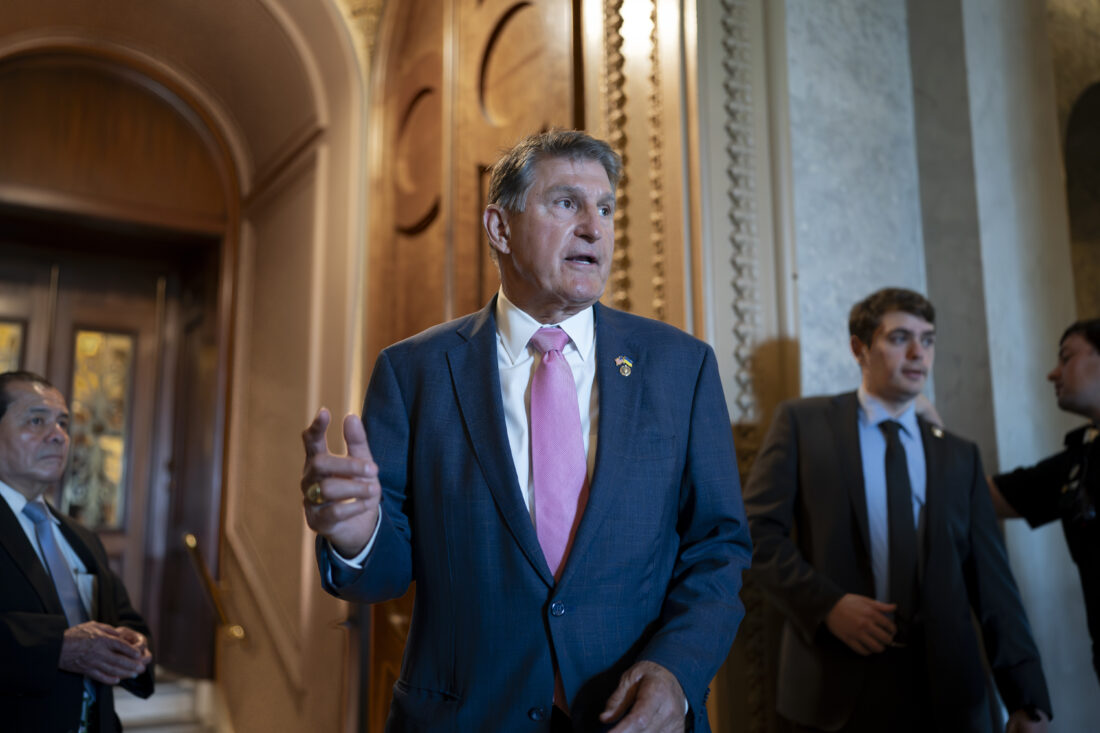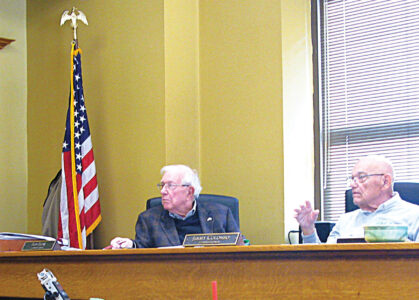Manchin holds hearing on next steps for permitting reform

Sen. Joe Manchin, D-W.Va., chairman of the Senate Energy and Natural Resources Committee, speaks to a colleague just outside the chamber, at the Capitol in Washington, Tuesday, June 13, 2023. (AP Photo)
CHARLESTON — Congress took preliminary steps in July toward permitting reform for major energy infrastructure projects, but Sen. Joe Manchin said Wednesday more can be done. Manchin, D-W.Va., chaired a hearing Wednesday morning of the Senate Energy and Natural Resources Committee to discuss the next steps for permitting reform. “Today we continue the important work of considering reforms to our energy permitting system and the state of energy on our public lands and waters,” Manchin said in his opening remarks. “Permitting reform is essential for more reliable and affordable energy and to make our country more secure and competitive.” West Virginia’s congressional delegation has supported permitting reform with Manchin last summer introducing his own reform language as part of a bill to keep the federal government funded, though Manchin was forced to pull that language. Some permitting reform proposals were included in the debt ceiling deal, the Fiscal Responsibility Act of 2023, passed in June and signed by President Joe Biden. “Congress took a meaningful step forward in June with the Fiscal Responsibility Act … with several common sense reforms that I know had bipartisan support from our committee members,” Manchin said. “That included firm deadlines to complete reviews, requirements that agencies work simultaneously on a single environmental review, and several others. But there is still much more to do.” Wednesday’s hearing was a continuation of a hearing held by the committee in May. But with the passage of the debt ceiling bill with its permitting reform language, Manchin said Wednesday’s hearing would focus on how to expand on that bill and continue the permitting reform effort. One focus going forward will be electric transmission and improving the national grid. PJM Interconnection, which coordinates the movement of wholesale electricity in a 13-state region including West Virginia, raised concerns in February about grid reliability as more coal and natural gas-fired power plants shut down, as renewable energy sources take more time to go online and as demand increases as consumers switch to electric vehicles. Manchin said new electric transmission lines are not being built at the pace needed with 2021 being the lowest point for transmission line construction in the last 10 years. The biggest hindrance for new construction was the cost, site location, and engineering and planning for new lines, Manchin said. “Long-distance transmission and inter-connectivity enables power to move to where it’s needed,” Manchin said. “Of course, transmission infrastructure alone isn’t enough for reliability. We also need dispatchable generation like coal, natural gas, hydropower and nuclear. But without transmission, that generation has nowhere to go and can’t help the areas that need it.” New pipeline and energy projects also can be slowed down by the courts. Manchin’s permitting reform package last summer would have set statutory limits on court challenges, require the random assignment of federal circuit judges to permitting cases and set tight deadlines for allowing federal agencies to respond if a federal court vacates or remands a permit. “One critical element which wasn’t included in the debt deal that would benefit all types of energy projects, from pipelines to offshore wind to mining projects, are judicial reforms,” Manchin said. “While the debt deal shrunk NEPA (National Environmental Policy Act) review timelines down to no more than two years, as we all know, litigation on the back end can add many more years to the permitting process after agencies complete their work.” While the debt ceiling deal included no language deadline with judicial review in the permitting reform language, it did include language to require federal agencies to issue all remaining permits for the 304-mile Mountain Valley Pipeline that will transport natural gas from Wetzel County to central Virginia. It also moved legal jurisdiction for the project from the Fourth Circuit U.S. Court of Appeals in Richmond, Va., to the D.C. Circuit. A three-judge panel of the Fourth Circuit issued a stay of the pipeline project last week after several environmental groups challenged the constitutionality of the permitting reform language in the debt ceiling agreement and whether Congress violated the separation of powers between the legislative and judicial branches by moving jurisdiction for the pipeline project to a different federal circuit. That stay has been appealed to the U.S. Supreme Court where several lawmakers, including Manchin, have filed briefs in support of lifting the stay. “In my home state of West Virginia, just one project, the Mountain Valley Pipeline, has faced dozens of lawsuits in the five-plus years since they received all necessary federal permits,” Manchin said. “All of these parts of the judicial process can and should be structured so that everyone gets their day in court, but project developers of all kinds have more certainty.” The committee also heard testimony Wednesday about the permitting process for energy projects on federal lands. Steven Allen Adams can be reached at sadams@newsandsentinel.com.





